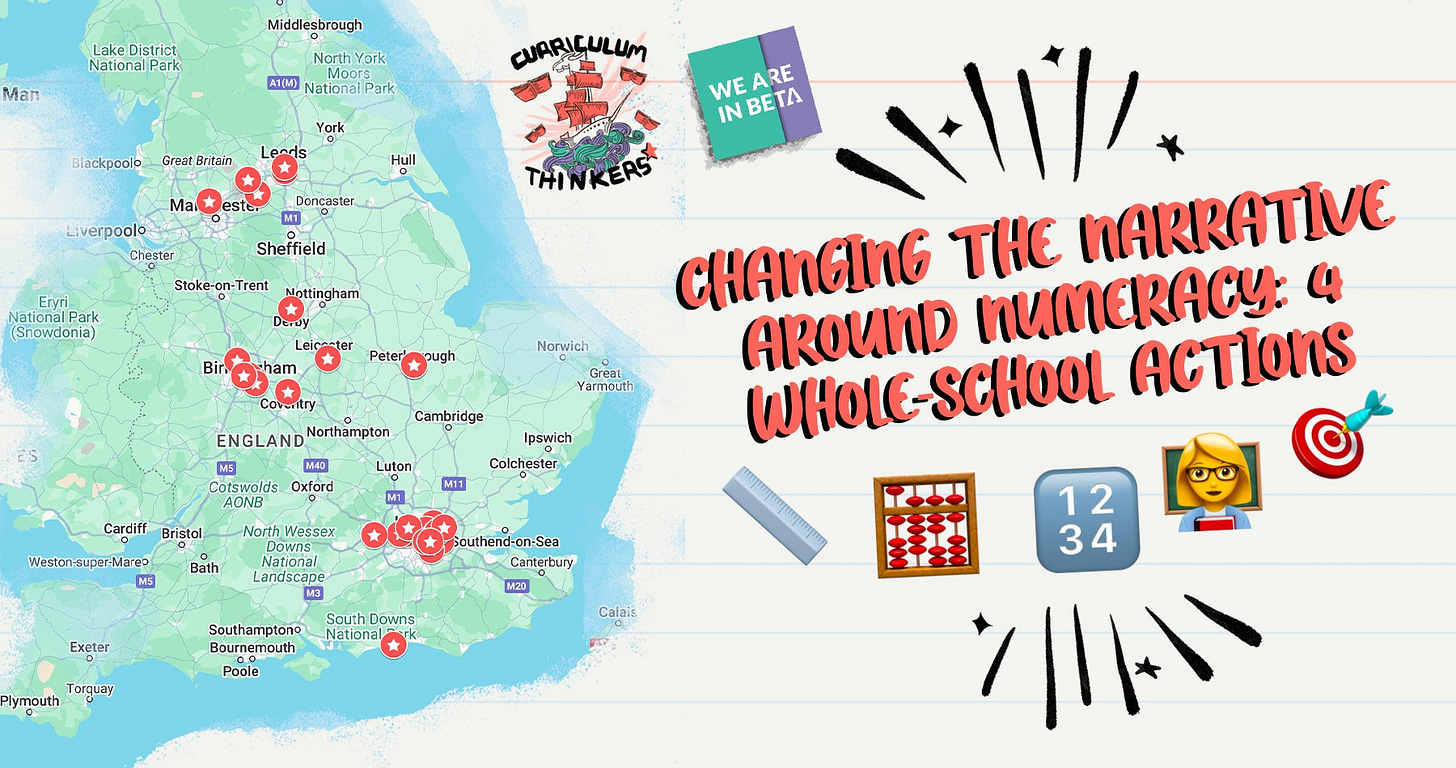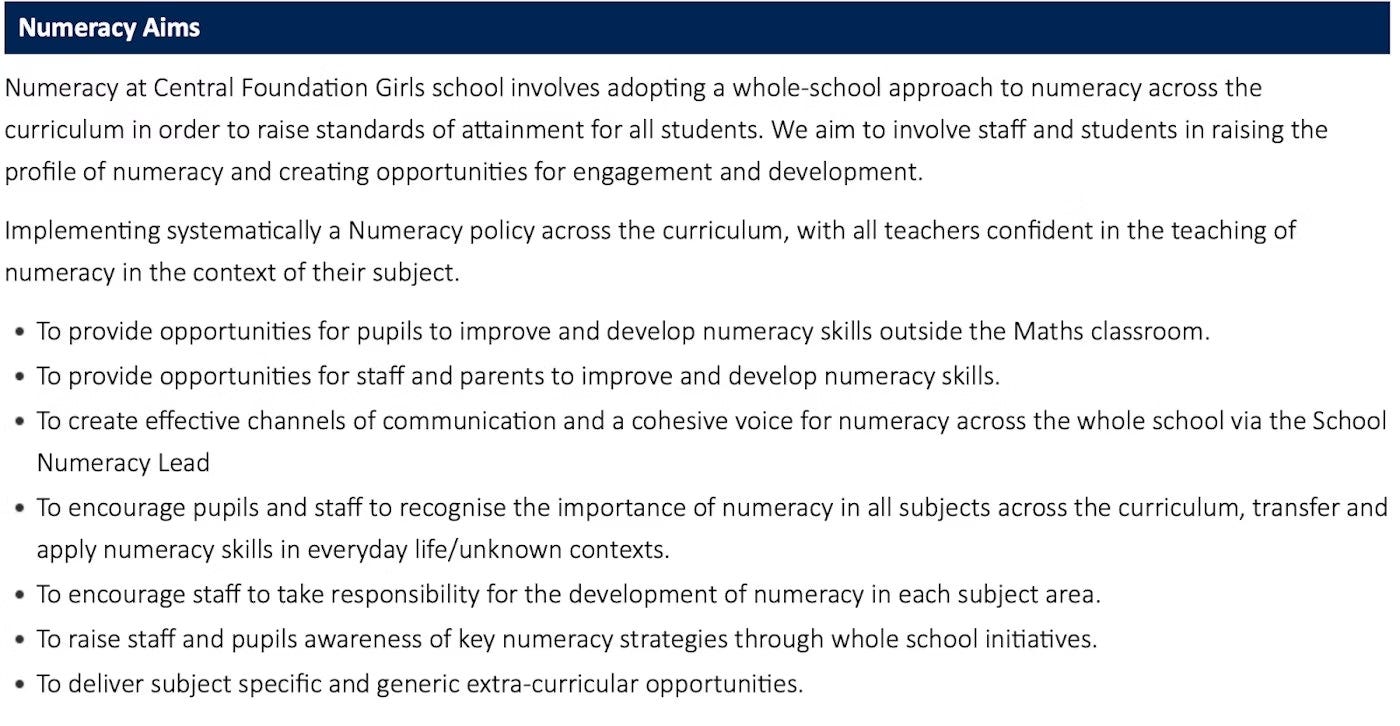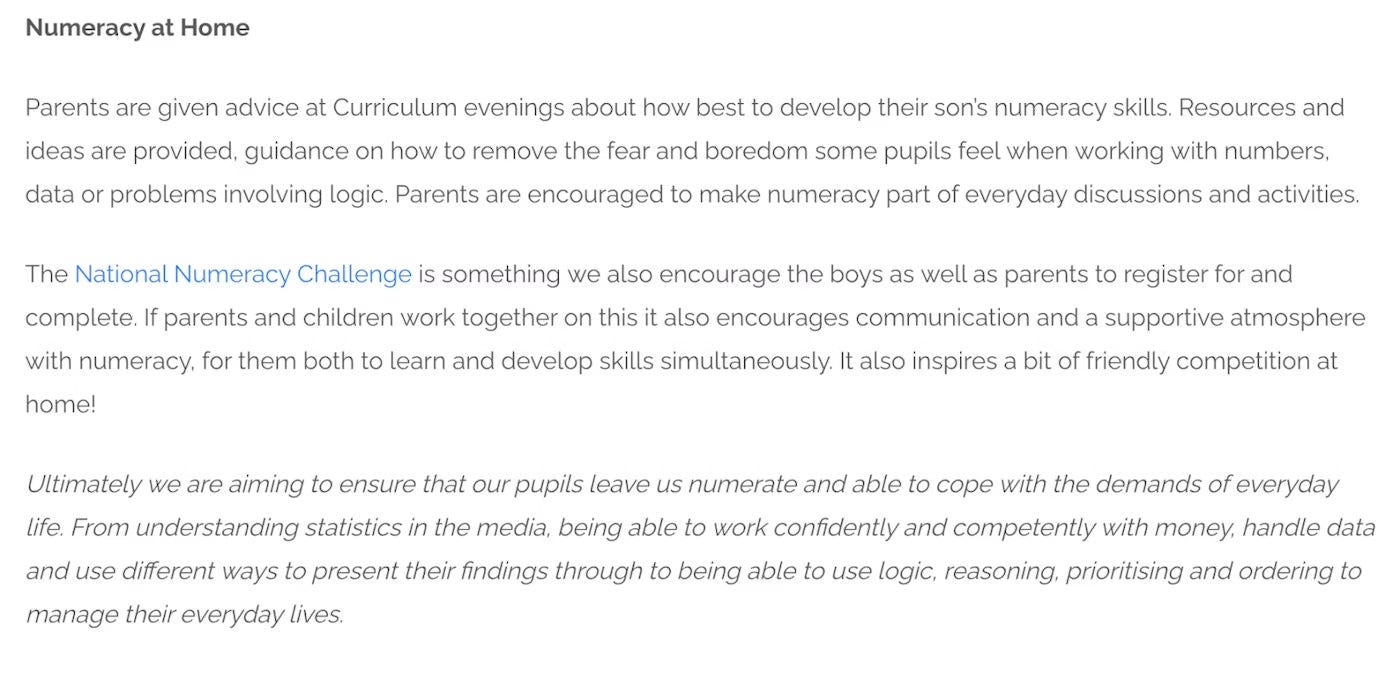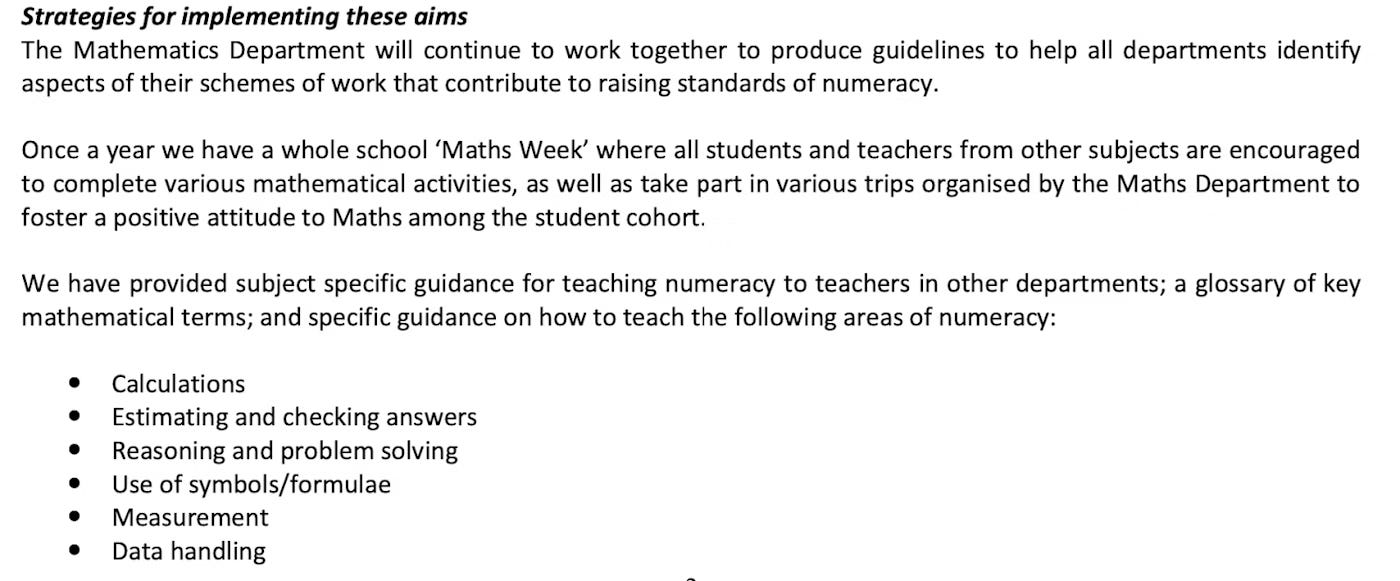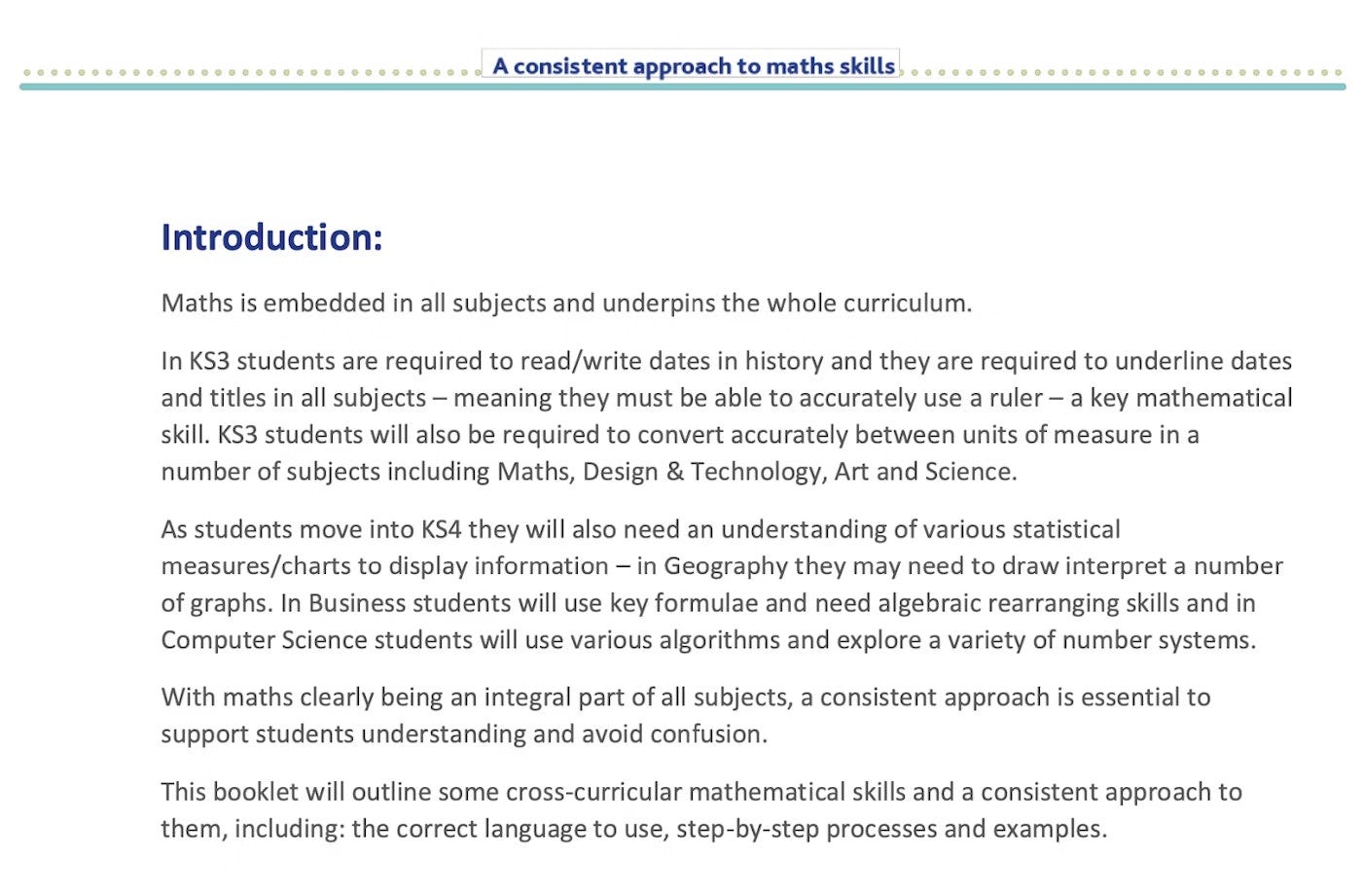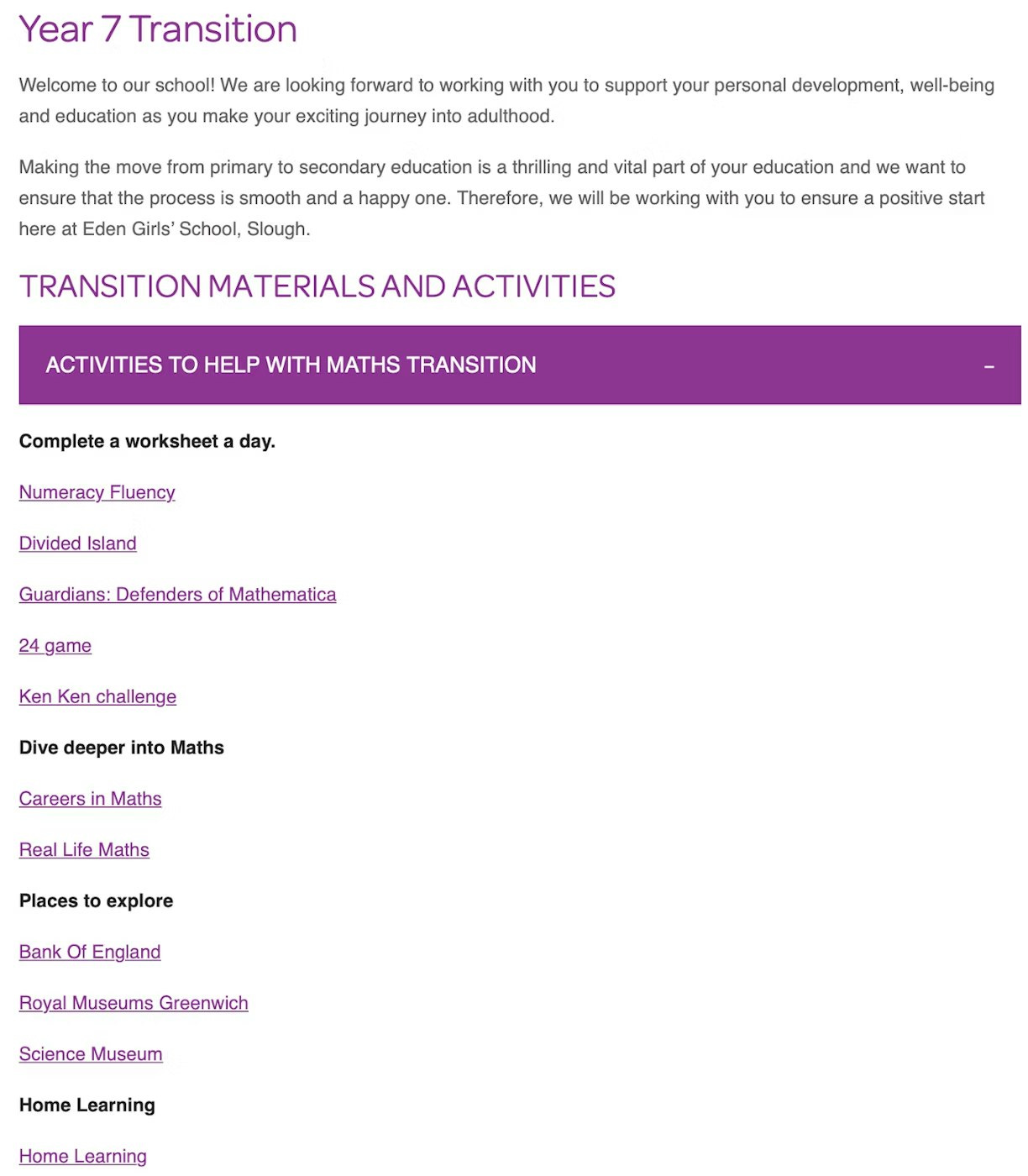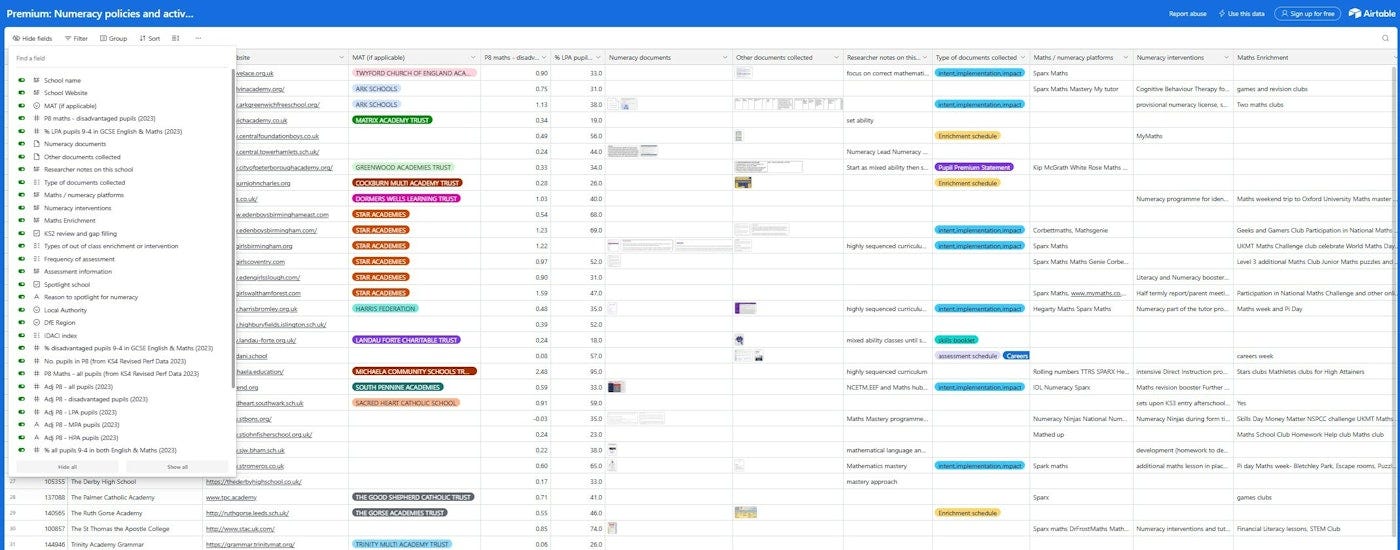Numeracy - changing the narrative: 4 whole-school actions.
Numeracy matters. Here's what others are doing about it (and you can too).
This is another guest post by our wonderful Curriculum Thinkers Community member, Louise Ferrier. If you find it useful, she’d love to hear your thoughts in the comments here. We hope the exams are going well.
While narratives and numeracy may not seem natural bedfellows, there is a whole backstory to numeracy that really, and I mean really matters if our numerical endeavours are to be successful whole-school. We are talking here about shaping the metacognitive mapping of maths in our students’ minds.
They have come to us with the weight of dad’s inability to master algebra 15 years ago, that look of terror on mum’s face when asked to help with the maths homework, and the internal narrative of little Barry’s embarrassment at freezing in a times table recital in Yr 6.
Almost all of us have a maths-related story to tell (mine relates to Mrs Hannon, god-rest-her-soul: a fraction-explaining legend but despite fighting my way to top-set, I was totally out of my depth and bombed) in a way that we don’t about other subjects (except perhaps PE!).
While the maths champions of a school walk a few inches taller than the rest of us who look up in awe at them, the rest of us start to develop an unhelpful complex.
When the National Numeracy charity’s maths-challenge tagline is “However you feel about maths, you're not alone”, it's clear there is a bit of a makeover well overdue.
It is time to change the narrative around numeracy.
Whatever our specialism, modelling the metacognition of everyday numeracy is a positive step in the right direction towards putting maths-anxiety back in its box. Modelling the struggle for students and demonstrating resilience helps to demystify the fear and welcome the challenge.
Whether we are calculating the number of minutes needed for extra-time candidates in a question, analysing some statistics in a tutor news slot or simply converting a mark to a percentage, we can all model a calm, logical approach to a challenge, by self questioning out loud and identifying an appropriate method to show students that everyday numeracy is accessible to all.
What are schools doing to develop whole school numeracy? The excellent piece by Jessica Dobrolowski, published for members of the We Are In Beta community today, shows you what successful schools are doing now to close the attainment gap and improve numeracy outcomes.
From the 31 successful schools in her sample, she found for you…
7 explicit numeracy policies or statements, codifying the need, importance, definition and power of numeracy.
10 schools with specific work at the beginning on Year 7 baseline assessments and gap filling so that all students can get the support and knowledge they need to make rapid progress.
17 schools with explicit assessment schedules for maths, ranging from every 3 weeks to every term.
Academic interventions for maths: 12 examples of Maths revision clubs, 6 examples of Maths interventions and the online platforms and websites used by schools to support homework, fluency practice and track progress.
Wider support and enrichment for numeracy: 10 schools with clubs for high attainers, a further 15 schools for games and puzzle clubs for the fun and interactive side of Maths, 11 schools with drop-down days for Maths and 2 with university partnerships.
From this exploration, Jessica has built for you a rich database of information and documents from the 31 successful schools, offering you first-hand sight of the approaches in maths and whole school numeracy they use.
Access this database and read about the 5 pieces of school practice Jessica has case studied here. Available for all members of the Curriculum Thinkers community.
To help you learn from all that Jessica has found, in this piece I have dug into her rich repository of ideas to see how schools have been specifically working to change the whole-school narrative on numeracy using these four actions:
Getting parents involved in improving numeracy
Embedding numeracy CPD for staff
Capitalising on peer-to-peer support and influence with Student Leaders of numeracy
Building a rich culture of numeracy across diverse aspects of the school
But before we get into them, a quick public service announcement.
🗳️ Just one week to go to join the lineup for Curriculum Thinking Week 2025
Members have been busy nominating colleagues and submitting sessions for our Curriculum Thinking Week conference from July 7th to July 11th
If you’ve not yet nominated or submitted, here are the key resources you’ll need:
Sessions shared last year
Form to tell us you would like to speak
Template slides - as GSlides or as PowerPoint.
Form to tell us someone in your team is doing incredible work
Free speaker access to see what speakers have delivered in the past
We’d love to have you involved.
If you’d like to join the line up, here are some key dates:
By Wed 11th June - tell us you'd like to speak in this short form
By Monday 23th June - share your session outline in this form
By Friday 27th June - record your session, and when it is ready, upload video, slides and docs
w/c 7th July – conference goes live! Jump in to meet fellow speakers, discuss sessions and learn from a wealth of ideas and resources on offer.
What are you (or your team) working on that’s making the biggest difference to your students’ outcomes in your subject?
Whether it’s… reading, writing, exam prep, AI, targeting groups such as SEND or something else…
…we’d love to help you show others what it looks like in your classrooms, celebrate it and get feedback on it for you.
4 whole-school numeracy actions.
1. Getting parents involved in improving numeracy
Long gone are the days of wide-spread government-funded family learning programmes starting with parents and toddlers. It is little wonder then that weakening adult numeracy has an impact on the confidence of parents to support numeracy development at home. A survey carried out by National Numeracy found that:
“59% of parents say maths was the toughest lesson to teach their kids during lockdown, and the same proportion say that doing so highlighted their own lack of confidence in numbers.”
National Numeracy also cites levels of maths anxiety at over a third of adults in the UK with one in five being so anxious about facing numbers that it makes them feel physically sick.
The government has introduced ‘Multiply’, a series of adult courses available across the country intended to build confidence with numbers (found via the National Careers Service). While the National Numeracy Day, now in its 4th year, provides a focus on the importance of developing numeracy skills across the population. It also provides a numeracy challenge for us all to test how good our skills really are and signposts to resources to support where it finds a weakness.
So what role can schools play in supporting our students by supporting their parents?
Well firstly, many of us practitioners are also parents - begging the question, are we aware of how to support our own children’s maths developing numeracy if we are not experts in the field?
What I love about the Central Foundation School for Girls ‘Numeracy Aims’ below is their recognition that we are all able to improve. It recognises that staff and parents both need to be given opportunities to develop in numeracy.
St Bonaventure's RC School also gives specific advice for parents and encourages them to work alongside their child to make numeracy part of everyday life.
Explore the examples from all 31 schools here.
2. Embedding numeracy CPD for staff
Given the high levels of maths anxiety in UK adults, some of those adults are teachers. Whilst it is critical that teachers don’t fall into the trap of stereotyping by subject specialism (untold harm to a numeracy strategy can come from the maths-anxious teacher who tells their class that they are terrible with numbers).
To support this, a prominent feature of the successful strategies included in the research were the inclusion of professional development in the numeracy policies. This example from St Oscar Romero Catholic School’s numeracy policy outlines how each department will focus on six key areas of numeracy:
In the database, you’ll find a document from Landau Forte College which outlines their consistent approach to maths skills and knowledge. It serves as a reference point for both parents and non-specialists to ensure the terminology and approach is consistent with the way in which students are being taught.
Whilst maintaining the integrity of how maths is delivered, this document also builds confidence in non-specialists' ability to include numeracy in everyday classroom situations.
Sent this by a friend?
3. Capitalising on peer-to-peer support and influence with Student Leaders of numeracy
Student leaders in numeracy send a message to the student body that numeracy matters here. Whether numeracy leaders take the form of ambassadors, club leads, peer-to-peer support drop-ins or organising events, they are owning and investing in the image of numeracy across the school.
As a school with over 70 KS3 ambassadors covering literacy, numeracy and anti bullying, the Ruth Gorse Academy summarises it clearly:
“we recognise their considerable contribution to the Academy and the fact that they are a role model for other students”
At Central Foundation School for Girls, numeracy ambassadors are also involved in the problem solving of how to identify and overcome barriers to numeracy engagement.
Peer-led engagement not only boosts the confidence of the leaders themselves but also creates a sense of shared ownership for numeracy across the school. When learners see their peers celebrating maths, not just their enthusiastic teachers, it shifts the narrative to numeracy as something to be enjoyed, shared, and valued by everyone.
4. Building a rich culture of numeracy across diverse aspects of the school
It’s time to celebrate all things numeracy! Changing the numeracy narrative means deliberately creating a culture of numeracy that makes it visible and engaging across the whole school community.
While many schools are using technology to support personalised and structured practice outside of the classroom (Sparx Maths was the most popular used by the schools in the research), technology alone isn’t the answer to making numeracy socially rewarding. Lunchtime and after school clubs such as chess, puzzle clubs and even origami are being used by the schools to build confidence, problem solving skills and to reshape how students experience mathematical thinking.
The schools featured in the study are deliberately using competitions and challenges to build excitement and celebrate numerical thinking. National initiatives such as the UKMT or Maths Week featured regularly but schools also run in-house challenges, tutor-group competitions and have numeracy points to be collected as part of the reward system.
These activities don't just stretch high attainers, they offer opportunities for all students to experience success and recognition in numeracy. Together, these strategies show that numeracy can be embedded into the cultural life of a school, reducing anxiety and raising the profile of maths as a shared and valued skill across all subjects and year groups.
At St Bonaventure’s RC School the numeracy culture takes the form of a plethora of trips, challenges and events such as their description below of the NSPCC Number Day Challenge:
Their positive tone and range of opportunities come together to create a culture of numeracy which also includes these enrichment activities:
Skills Day
Money Matters
NSPCC challenge
UKMT Maths Challenge
East London Maths Challenge
KS4/5 Masterclass at King’s College
STEM activities and competition such as Cipher Challenge
Count On Us Maths competition
MoneyWise Challenge
Numeracy trips abroad
Museum Numeracy visit
Bletchley Park
Setting the tone for a culture of numeracy starts early. At Eden Girls Academy, Slough, parents are enlisted to begin the culture at home with a list of resources to support transition from Yr6 to 7 using games and puzzles and real-world examples.
Explore Jessica’s set of case studies and the full database of numeracy policies and activities here.
Next week I’ll explore cross-curricular and subject-specific examples of championing numeracy.
See you there!
If you're investigating or evaluating your own school’s numeracy provision, paying members can read part II of this article, which allows you to see which schools employ which strategies and resources so you can investigate further and contact them.
Paying members have the ability to:
find schools like yours in a filterable and sortable directory of schools and strategies
access a bank of dozens of numeracy resources and more
Not a member? Get a trial here
Access the full analysis and download numeracy resources from a single database
To help you find schools like yours, we’ve created a sortable and filterable directory* of numeracy practice.
*Access
Lite version here: numeracy strategies without resources
Premium version here: numeracy strategies, resources and named schools.
Resources and recordings are only available to paying members of the Curriculum Thinkers Community who can:
learn from hundreds of recordings covering every aspect of curriculum development across 20 subjects
download 2000+ resources - both whole school and subject specific
access 700+ academic related policies, plus analysis of them, from successful schools - T&L, assessment, homework and more.
Not a member? Get a trial here
Already a member but can't access, DM Fiona Flint and ask her for your membership activation link.
Sent with ❤️ from the Curriculum Team at We Are In Beta


